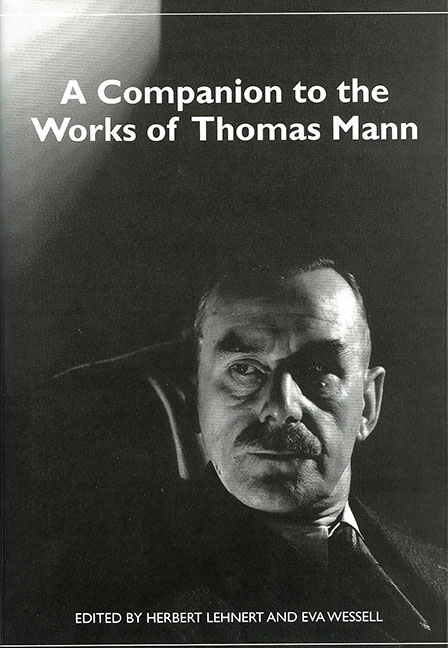Book contents
- Frontmatter
- Contents
- Foreword
- Thomas Mann's Works
- List of Abbreviations
- Introduction
- Thomas Mann's Beginnings and Buddenbrooks
- Art and Society in Thomas Mann's Early Novellas
- Love in Society: Thomas Mann's Early Stories
- “Death in Venice”
- “Mein ‘Friedrich’ — das ist was Anderes”: Thomas Mann's Unwritten Novel about Frederick the Great, King of Prussia
- Magic and Reflections: Thomas Mann's The Magic Mountain and His War Essays
- Thomas Mann's “Autobiographical” Stories
- Joseph and His Brothers
- Lotte in Weimar
- Thomas Mann's Late Politics
- “German” Music and German Catastrophe: A Re-Reading of Doktor Faustus
- The Gaze of Love, Longing, and Desire in Thomas Mann's “The Transposed Heads” and “The Black Swan”
- Felix Krull
- Female Identities and Autobiographical Impulses in Thomas Mann's Work
- Betrayed or Not Betrayed: A Testament?
- Thomas Mann's Comedies
- Notes on the Contributors
- Select Bibliography
- Index
Betrayed or Not Betrayed: A Testament?
Published online by Cambridge University Press: 28 April 2017
- Frontmatter
- Contents
- Foreword
- Thomas Mann's Works
- List of Abbreviations
- Introduction
- Thomas Mann's Beginnings and Buddenbrooks
- Art and Society in Thomas Mann's Early Novellas
- Love in Society: Thomas Mann's Early Stories
- “Death in Venice”
- “Mein ‘Friedrich’ — das ist was Anderes”: Thomas Mann's Unwritten Novel about Frederick the Great, King of Prussia
- Magic and Reflections: Thomas Mann's The Magic Mountain and His War Essays
- Thomas Mann's “Autobiographical” Stories
- Joseph and His Brothers
- Lotte in Weimar
- Thomas Mann's Late Politics
- “German” Music and German Catastrophe: A Re-Reading of Doktor Faustus
- The Gaze of Love, Longing, and Desire in Thomas Mann's “The Transposed Heads” and “The Black Swan”
- Felix Krull
- Female Identities and Autobiographical Impulses in Thomas Mann's Work
- Betrayed or Not Betrayed: A Testament?
- Thomas Mann's Comedies
- Notes on the Contributors
- Select Bibliography
- Index
Summary
Thomas Mann's last story is known in English by the title of its translation: “The Black Swan.” Its author called the German original “Die Betrogene,” meaning “the betrayed woman.” The original title seems to promise a tale of a woman betrayed by a lover. The protagonist, Rosalie von Tümmler, does have a lover, but it is not he who betrays her; rather, she is “betrayed” by herself, by her idealistic worship of nature, which makes her believe that she can rejuvenate herself through her own inner power. Dying, however, she sees that her self-induced renewal was an illusion. But even the betrayal had value, as she tells her daughter on her deathbed: “Anna, do not speak of the betrayal nor of the derisive cruelty of nature. [. . .] Not willingly do I leave you and life with its springtime. But how could there be spring without death? For death is a great means of life. While death assumed the shape of resurrection and sexual desire [Liebeslust] for me, that was not a falsehood, but goodness and mercy [Gnade].” Rosalie accepts her death in religious terms, a religion that draws from her love of nature. Her last words are: “Nature I have always loved, and it granted love to her child.”
The contradiction of Rosalie being betrayed and not betrayed is only one incident of Mann's multifaceted way of writing. He makes his reader see the world from different points of view or perspectives. Mann was a disciple of Nietzsche not in spite of, but because of the philosopher's contradictions. The much-discussed irony in Mann's writings expresses multivalence: not the traditional irony of two meanings of which one is valid, the other not, but a language that acknowledges that the world has many aspects which may be of different value without being arranged in a predetermined hierarchical order. Our world, the modern world, can be put into words only if more than one perspective is invoked.
The words “resurrection” (Auferstehung) and “sexual desire” (Liebeslust) appear next to each other in Rosalie's last words in the story. The resurrection of Christ is the center of the Christian faith, or myth (in the sense of a religious narration) that Jesus’ self-sacrifice means his loving atonement for the sins of mankind. Rosalie's resurrection signifies her own reawakened physical love, which turns into love of nature.
- Type
- Chapter
- Information
- A Companion to the Works of Thomas Mann , pp. 297 - 306Publisher: Boydell & BrewerPrint publication year: 2004

